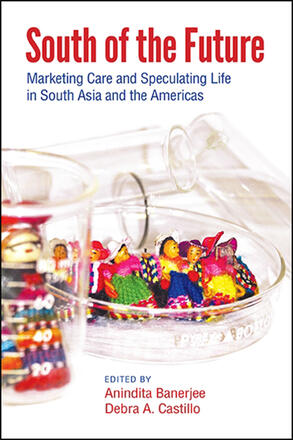
South of the Future
Marketing Care and Speculating Life in South Asia and the Americas
Alternative formats available from:
Unique interdisciplinary analysis of gendered and racialized economies of care in South Asia and the Americas.
Description
South Asia and Latin America represent two epicenters of migrant care work and the globalized reproductive market. Yet scholars and the media continue to examine them in geographical and conceptual isolation. South of the Future closes both these gaps. It investigates nannying, elder care, domestic work, and other forms of migrant labor in the Americas together with the emerging "Wild West" of biotechnology and surrogacy in the Indian subcontinent. The volume is profoundly interdisciplinary and includes both prominent and emerging scholars from a wide variety of fields, including anthropology, law, literary and cultural studies, science and technology studies, and social policy. These contributors speak to the dynamic, continually changing facets of the nexus of care and value across these two key regions of the global south. By mobilizing specific locations and techno-economics and putting them into dialogue with one another, South of the Future rematerializes the gendered, racialized bodies that are far too often rendered invisible in structural analyses of the global south, or else are confined to particular geo- and biopolitical paradigms of emerging markets. Instead, these bodies occupy the center of a global, highly financialized economy of creating and sustaining life.
Anindita Banerjee is Associate Professor of Comparative Literature and chair of the humanities concentration in the Environment and Sustainability Program at Cornell University. Her most recent book is Science Fiction Circuits of the South and East. Debra A. Castillo is Stephen H. Weiss Presidential Fellow, Emerson Hinchliff Professor of Hispanic Studies, Professor of Comparative Literature, and Director of the Latina/o Studies Program at Cornell University. She is the author or editor of several books, including Redreaming America: Toward a Bilingual American Culture, also published by SUNY Press.
Reviews
"While there have been studies on the individual countries featured in the book, there are no previous studies that bridge the gaps between South Asia and the Americas in terms of speculative fiction or in terms of care policy. The comparative aspect for these regions is new, and the introduction of chapters dealing with different kinds of speculative futures is a welcome addition. " — Bodhisattva Chattopadhyay, University of Oslo
"This is a groundbreaking volume for several reasons. The interdisciplinary collection of social sciences and humanities creates a compelling argument for understanding how literary and anthropological studies can enrich each other. I applaud how it puts the various regions of the global south into productive conversation. " — J. Andrew Brown, Washington University in St. Louis